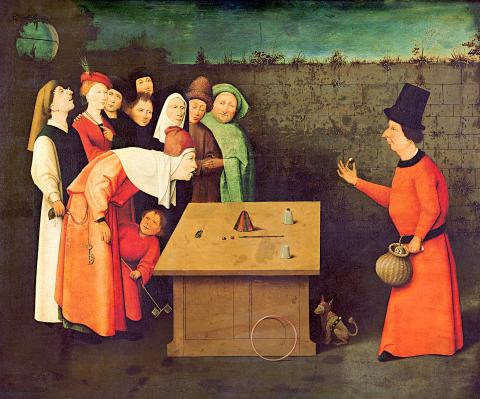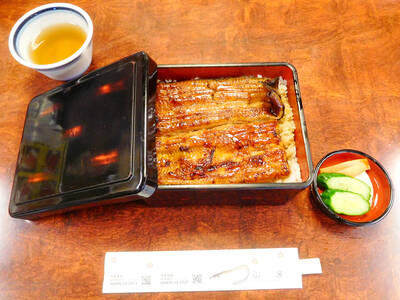Chinese Practice
無中生有
(wu2 zhong1 sheng1 you3)

Photo: Wikimedia Commons
照片:維基共享資源
create something from nothing
前幾週「活用成語」單元,我們介紹了三個出自「三十六計」的成語:「釜底抽薪」、「渾水摸魚」和「三十六計,走為上策」。這次要介紹成語是「無中生有」,屬三十六計中「敵戰計」的第一計,意思是「從無中創造出有」。此概念咸認出自道家經典,老子的《道德經》——第四十章寫道:「天下萬物生於有,有生於無」(世上所有東西都來源於某物﹝質﹞);而這某物是從虛無中所產生出來的)。然而,戰略上的「無中生有」和老子用以解釋事物起源的原意相去甚遠:「無中生有」的戰略是創造一種幻覺來欺騙敵人,讓他們誤以為有某些事物存在,或是反過來把有的說成沒有。比如在實際行動之前多次假裝進攻,等到後來敵方以為又是一次佯攻時,卻是真正的進攻,讓敵人猝不及防。
現今成語「無中生有」的用法通常含有否定的意義,意指本無其事,憑空捏造。意義相符的英文片語應為「plucked (or conjured) out of thin air」(憑空抓出(或召喚出)東西來)。這裡的動詞「to pluck」(抓出、拔出)是用手抓住並一下子快速移動,似乎是不假思索的動作;「thin」(稀薄)用於形容「air」(空氣)以強調其沒有實體;「conjure」(召喚)則是施魔法來創造。
另一片語「pull a rabbit out from the hat (or bag)」(把兔子從帽子(或袋子)中拉出來)也隱含有憑空召喚出事物的意思。像魔術師常用的把戲,在觀眾以為是空的帽子或袋子裡,抓出一隻活兔子來。這句話可以用來形容人能夠做出令人驚訝或出乎意料的事,而在最後關頭把問題解決。
最後,這種出其不意的情況在最後一刻出現而把問題給解決的情形,還可以用另一個片語來表示:「deus ex machina」。此為一古希臘術語的拉丁文翻譯,字面意為「來自機器的神」。它指古希臘戲劇的一種技巧,其運作的機制是用起重機(mechane)來把(扮演神的)演員放到舞台上。於是,棘手的情況經由這位神的干預,得以出乎意料地扭轉劣勢、轉危為安。今天,「deus ex machina」一詞仍被用來指寫作或電影中的情節手法──意料之外的事發生了,讓劇情急轉直下,令人很難信服,造成了劇評家所稱的「cop out」(理由牽強)的結局。
(台北時報林俐凱譯)
針對臉書流傳的那篇文章,部長予以駁斥,說該報導不僅未經事實查證,甚至無中生有、編造假新聞。
(The minister denied the allegations in the article shared on Facebook, saying that not only was there no evidence to support it, but that the story had been plucked out of thin air, and was fake news.)
藝術家在訪談中表示,創作的過程都很辛苦,有時得無中生有。
(During the interview, the artist relayed how difficult the creative process was, and how sometimes one had to just pull a rabbit out of the hat.)
英文練習
pluck out of thin air; pull a rabbit out of the hat; deus ex machina
In the past few weeks, Using Idioms has looked at three examples from the 36 Strategems, these being 釜底抽薪, 渾水摸魚 and 三十六計,走為上策. Another, this time the first of the “Enemy Dealing Stratagems” section, is 無中生有, meaning “creating something from nothing.” The concept is thought to derive from Chapter 40 of the ancient Chinese Taoist classic the Dao De Jing by Laozi, in which it is written 天下萬物生於有,有生於無 (All things on Earth are derived from something [substance]; this something sprang from nothingness). The strategic usage of 無中生有, however, is quite far removed from Laozi’s account of the origin of things: It deals more with the creation of an illusion to trick one’s enemy into thinking that something that is not actually there exists, or conversely that something that is there does not exist. One example might be to feign intention several times before actually carrying an action through, by which point the enemy is expecting a further feint, and has failed to prepare themselves for the attack.
In modern usage, 無中生有 is often used in a negative sense, to mean that something has been devised or fabricated with no basis in fact, or arrived at with no supporting evidence. A corresponding English phrase would be “plucked (or conjured) out of thin air.” Here, the verb “to pluck” means to grab or snatch with a single, rapid movement of the hand, as if giving the action little thought; “thin” is used to qualify “air” to emphasize its lack of substance; “conjure” means to create through the use of magic.
The idea of conjuring something up is also implicit in the phrase “pull a rabbit out of the hat (or bag),” a reference to the hackneyed magician’s trick of pulling a live rabbit out of a hat or bag previously assumed to be empty. It is used in situations where somebody is able to do something surprising or unexpected that enables them to solve a problem, usually at the very last minute.
Finally, this idea of the unexpected occurring at the last minute to resolve a situation is behind another phrase: deus ex machina. This is the Latin rendering of an ancient Greek term meaning, literally, “a god from the machinery.” It refers to the mechanics of a technique used in ancient Greek plays, where a crane (mechane) is used to place an actor (playing a deity) onto the stage. This deity might then perform an unexpected intervention in a tricky situation and save the day. Today, the term deus ex machina is still used to refer to a plot device in writing or movies where an unexpected intervention happens that stretches the credulity and provides what some critics of the device consider a “cop out” conclusion.
(Paul Cooper, Taipei Times)
Unless you can pull a rabbit out of the hat in the next two months, we’re going to go bankrupt.
(除非你有辦法在兩個月之內無中生有,不然我們就要破產了。)
Are you sure about those figures, or did you just pluck them out of thin air?
(你確定這些數字是對的嗎?還是說,這只是你憑空捏造的?)

Microsoft on Feb. 28 announced it was retiring Skype, the online voice and video call pioneer that the tech titan acquired in 2011. “Starting in May 2025, Skype will no longer be available,” said a post from Skype support on X, directing users to sign into Microsoft’s Teams platform for further use of its services. Skype was founded in 2003 by Scandinavians Niklas Zennstrom and Janus Friis in Estonia, revolutionizing Internet communication by offering free voice calls between computers and affordable rates for calls to landlines and mobile phones. Over the years, and as Internet speeds improved, Skype evolved to

A: It’s a pity that I can’t go to Australian pop diva Kylie Minogue’s concert. B: Why not? A: Hit Japanese singer Kenshi Yonezu is staging two shows at the Taipei Arena this weekend, and I already bought tickets long ago. B: Wow, isn’t he one of the most popular Japanese singers in recent years? A: And Yonezu’s megahit “Lemon” topped the Billboard Japan Hot 100’s year-end chart in 2018 and 2019 consecutively. A: 我不能去澳洲歌后凱莉米諾的演唱會真可惜。 B: 為什麼? A: 日本人氣歌手米津玄師週末將在小巨蛋熱唱兩場,我早早就買票啦。 B: 哇他可是日本近年來最紅的歌手之一。 A: 米津的神曲《Lemon》甚至還在2018、2019年連續稱霸告示牌日本單曲榜年度冠軍! (By Eddy Chang, Taipei Times/台北時報張迪)

A: Australian pop diva Kylie Minogue is set to visit Taiwan for the third time on Saturday. B: I remember that her Taipei concerts in 2008 and 2011 caused a sensation, and I love her megahit “Can’t Get You Out of My Head.” A: This will be her first time performing in the southern city of Kaohsiung. B: Many music critics praise Kylie’s show as “a must-see in your lifetime.” A: Let’s go to Kaohsiung this weekend. A: 澳洲歌后凱莉米諾週六即將三度訪台。 B: 她曾在2008、2011年兩度在台北開唱都造成大轟動,我超愛她的神曲《Can’t Get You Out of My Head》。 A: 這次可是她首度唱進南台灣的高雄呢。 B: 許多樂評家說她的演唱會是「此生必看」! A: 那我們週末去高雄吧。 (By Eddy Chang, Taipei Times/台北時報張迪)

Donburi, often simply called don, is a beloved Japanese dish that consists of a bowl of steamed rice topped with various other ingredients. The word donburi itself actually means “bowl” in Japanese, but it has come to represent much more than just a vessel. Donburi first emerged during the Edo period (1603–1867) as a quick and convenient meal for busy city dwellers. By the 19th century, donburi had become immensely popular among theater enthusiasts, who often purchased these portable meals to enjoy during long performances. Una-don, a donburi topped with grilled eel, was a particular favorite. Easy-to-carry and satisfying,